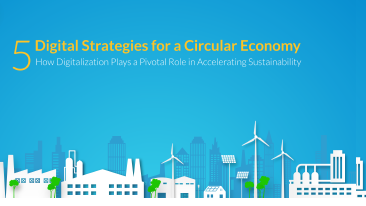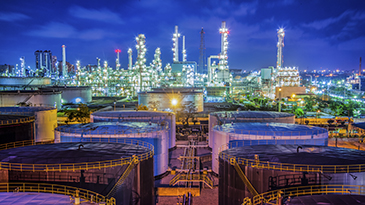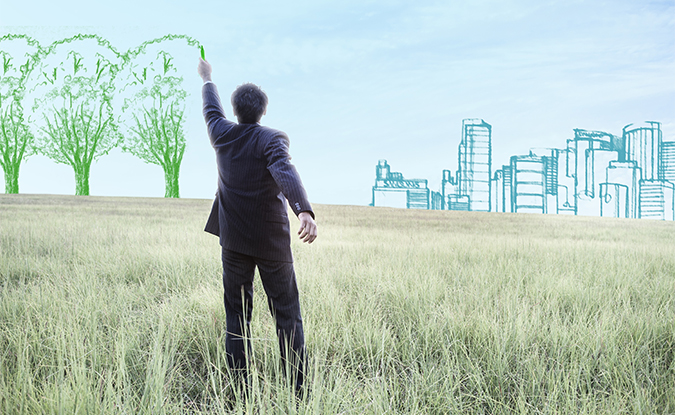I have been aware of Earth Day for many years, participating in work and community-related activities to raise awareness about caring for our planet. But this year, somehow it feels different. Something about the significant disruptions that we have experienced this past year has changed my perspective. And I am fairly certain that I’m not alone in having this new point of view.
Our collective experience of the pandemic changed our view of risk. We never expected that global economies could be shut down by a virus, that our personal health was at risk simply by visiting a restaurant or boarding an airplane. Now we may wonder what other risks we disregarded or downplayed. Coming out of the COVID-19 crisis, which managed to make something so global so personal, so individual for each of us, we may have a better understanding of the interconnectedness of it all. And how our individual behavior, lifestyle or profession might impact societal concerns like efficiency, energy choices and waste generation.
Many consumers are changing their buying behavior based on this new awareness, making different product choices considering the perceived impact on the environment. Some of this activity started before the pandemic but it has accelerated in recent months according to McKinsey data.1 For some it means shifting away from plastic options; others are responding to new product labels that indicate more bio-based raw materials or a smaller CO2 footprint.
At the same time, markets are experiencing unprecedented levels of volatility as established norms and forecasting methods have been upended; first by the pandemic, then by rapid and uneven economics shifts, and now by an evolving perception of what the new normal may be. [Credit to consultant Paul Hodges who began using "New Normal" more than a decade ago and shared his views on this site in 2020.]
A recent report by the World Business Council on Sustainable Development captured this uneasy sentiment well, highlighting that the pandemic is “part of a wider pattern of volatility and uncertainty. More and more, the impact of our linear consumption of material resources has left the world facing a series of defining, complex and interdependent environmental challenges.” 2
As the world’s largest chemical company, BASF is certainly taking note of this shift. At its Capital Markets Day last month the company emphasized its CO2 emission reduction commitments of 25% by 2030 and net zero by 2050, following a trend seen by many global leaders in the processing industry. BASF CEO Dr. Martin Brudermüller noted that “customers are seriously talking about this . . . They basically tell me, give me a plan on how you will actually provide me with a low CO2 footprint in 2030.”
Electrification of major petrochemical processes will be an important innovation in CO2-emission reduction efforts, and BASF recently announced a new joint agreement with SABIC and Linde to develop electrical furnaces for steam cracker operation. This is but one of many examples demonstrating how companies are pooling their innovation resources to accelerate progress toward ambitious sustainability targets.
These themes of collaboration and innovation were highlighted in an executive dialog at CERAWeek last month between the CEOs of Dow and LyondellBasell. They agreed on the issue that ambitious net zero emission targets—which both of their companies have committed to by 2050—means implementing technologies that do not yet exist. And significant innovation is needed to scale promising new technologies, like advanced plastics recycling, to meet the waste challenges we have today.
Plastic waste is another aspect of the sustainability challenge, made more apparent as use has increased and waste outlets have shifted in recent years. This waste is only one aspect of the larger concept of the Circular Economy where products and processes must be fundamentally redesigned to eliminate emissions and waste and to reduce the impact on the environment. As discussed in a previous blog, innovation strategies and collaboration across the value chain are enabled and accelerated through digitalization.
We have a long way to go. According to the latest assessment, the world economy is only 8.6% circular, meaning that of all the minerals, fossil fuels, metals and biomass entering the economy each year only 8.6% is cycled back.3 Unfortunately, The Circularity Gap Report 2020 shows the trend is headed in the wrong direction (declining circularity), having been 9.1% two years earlier—reflecting growing mining and petroleum extraction and increasing urban construction.
This is the challenge as we recognize Earth Day 2021: to clarify our tools to show success and use them to define competitiveness and identify leaders in sustainability efforts. Much of the earlier activities begun years ago relied on feel-good ideas and thoughts of future generations – of course these are valuable concepts (certainly to me) but the topic is too important to be lost to subjective measures. Business and economics demand a scale, based on actual data, and we now need to agree on what that will be. The good news is that digital capabilities now give companies the means to base that scale, those new metrics, on data, and drive progress toward challenging future goals.
“I wrote about this challenge in an industry publication4 more than 20 years ago (snapshot above) – hopefully we can make faster progress in the next two decades.”
Regardless of your business focus on either immediate resource efficiencies, longer-term circular economy, or energy transition strategies, metrics will be key to defining progress. Collectively we have learned that standard financial assessments will not encourage progress toward sustainability, as investor groups continue to acknowledge.
Sustainability will be front and center at AspenTech’s user event OPTIMIZE 2021 next month – it is virtual and complimentary this year. Join us to learn from thought leaders as they discuss the digital strategies to help drive new levels of sustainability and profitability. Companies will share their success stories in applying digital solutions to address sustainability challenges, including sessions focused on the Circular Economy and Energy Transition.
Notable content includes:
• Executive panel discussion on how the “Sustainability Imperative” is transforming processing industries
• Sustainability strategies from leading companies including BASF, Braskem, Evonik, FP Corporation, Nova Chemicals, Philips 66, Saudi Aramco.
• Companies sharing their successful use of digital solutions to cut energy use, reduce waste, avoid unexpected releases, integrate recycled feedstock and many more.
If you agree that this Earth Day somehow feels different, I challenge you to think about your own reasons this is so. I’m hoping that you, too, come away with a better understanding of the global impacts from your own choices and decisions.
1 McKinsey & Company
2 World Business Council on Sustainable Development, Circular Transition Indicators, Feb 2021
3 Platform for Accelerating the Circular Economy, The Circularity Gap Report 2020, Jan 2020
4 Chemical & Engineering News, August 3, 1998





Leave A Comment